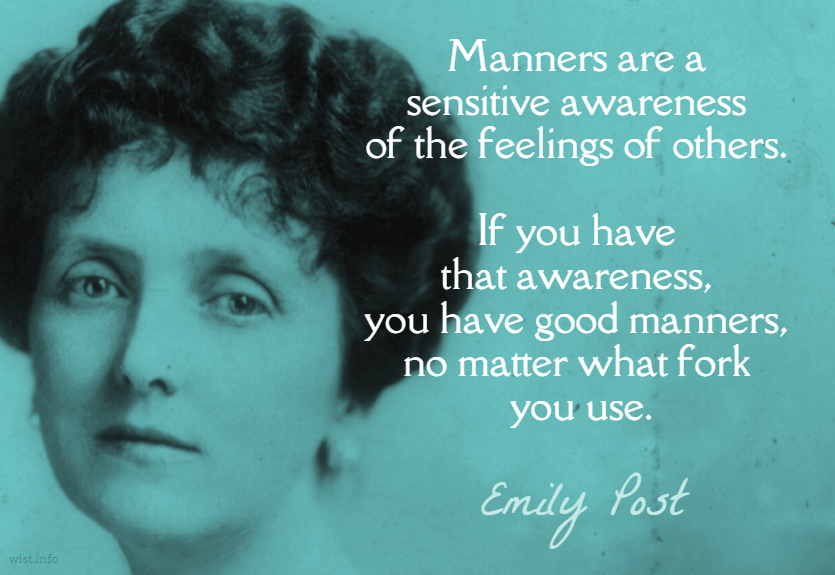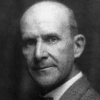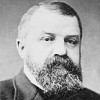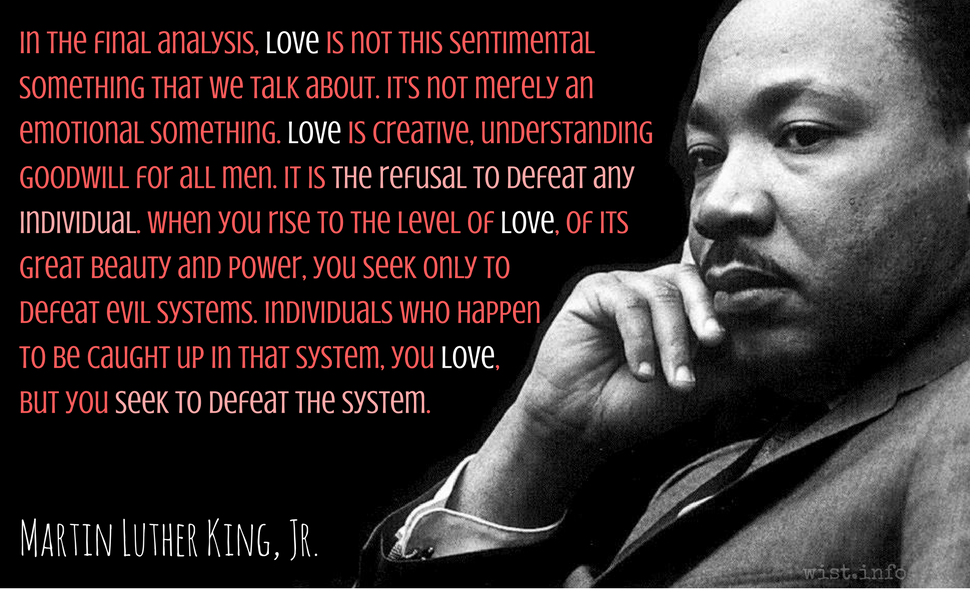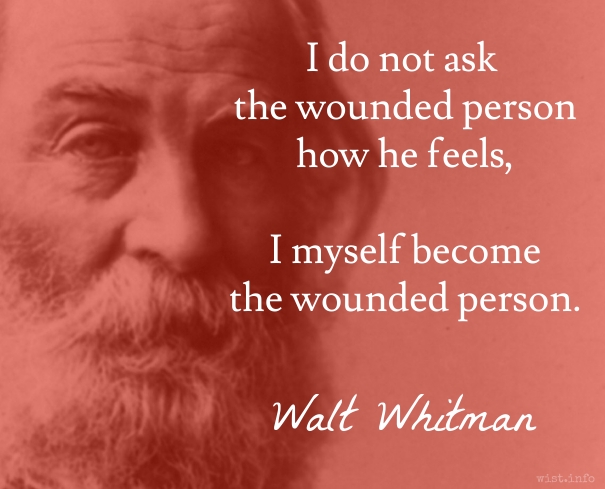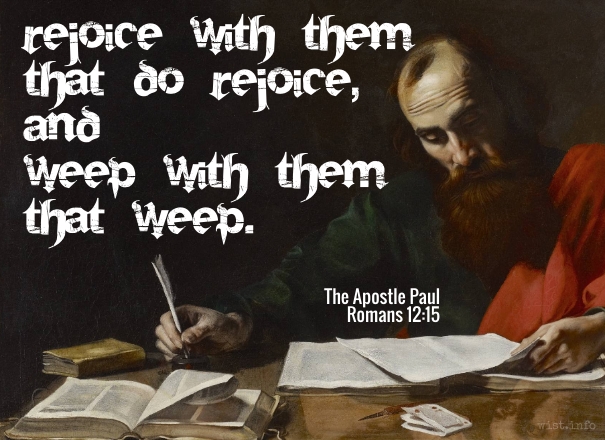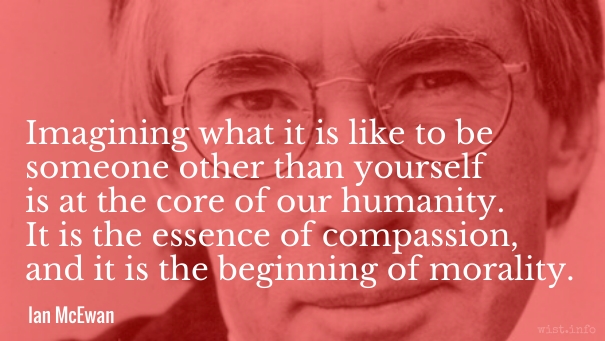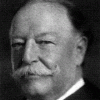We have all heard enough to fill a book about Dr. Johnson’s incivilities. I wish they would compile another book consisting of Dr. Johnson’s apologies. There is no better test of a man’s ultimate chivalry and integrity than how he behaves when he is wrong; and Johnson behaved very well. He understood (what so many faultlessly polite people do not understand) that a stiff apology is a second insult. He understood that the injured party does not want to be compensated because he has been wronged; he wants to be healed because he has been hurt.
Quotations about:
compassion
Note not all quotations have been tagged, so Search may find additional quotes on this topic.
Manners are a sensitive awareness of the feelings of others. If you have that awareness, you have good manners, no matter what fork you use.
Emily Post (1872-1960) American author, columnist [née Price]
(Attributed)
Often cited to her famous Etiquette in Society, in Business, in Politics, and at Home (1922), but not found in that work. Claimed as genuine by the Emily Post Institute.
Tolerance, good temper and sympathy — they are what matter really, and if the human race is not to collapse they must come to the front before long.
E. M. Forster (1879-1970) English novelist, essayist, critic, librettist [Edward Morgan Forster]
“What I Believe,” The Nation (16 Jul 1938)
(Source)
Your Honor, years ago I recognized my kinship with all living beings, and I made up my mind then that I was not one bit better than the meanest on earth. I said then, and I say now, that while there is a lower class, I am in it; and while there is a criminal element, I am of it; and while there is a soul in prison, I am not free.
Eugene V. Debs (1855-1926) American union leader, activist, socialist, politician
Statement to the Court (1918-09-18)
(Source)
On being convicted of sedition for urging resistance to the draft. Often paraphrased:
As long as there is a lower class, I am in it. As long as there is a criminal element, I am of it. As long as there is a soul in prison, I am not free.
We will match your capacity to inflict suffering by our capacity to endure suffering. We will meet your physical force with soul force. Do to us what you will, and we will still love you. We cannot in all good conscience obey your unjust laws because non-cooperation with evil is as much a moral obligation as is cooperation with good. And so put us in jail, and we will go in with humble smiles on our faces, still loving you. Bomb our homes and threaten our children, and we will still love you. Send your propaganda agents around the country and make it appear that we are not fit morally, culturally, and otherwise for integration. And we will still love you. Send your hooded perpetrators of violence into our communities at the midnight hours, and drag us out on some wayside road and beat us and leave us half dead, and we will still love you. But be assured that we will wear you down by our capacity to suffer.
And one day we will win our freedom, but not only will we win freedom for ourselves, we will so appeal to your heart and conscience that we will win you in the process. And our victory will be a double victory.
Martin Luther King, Jr. (1929-1968) American clergyman, civil rights leader, social activist, preacher
“Loving Your Enemies,” sermon, Detroit Council of Churches Noon Lenten Services (1961-03-07)
(Source)
Reprinted in edited form in King, Strength to Love, ch. 5 "Loving Your Enemies," sec. 2 (1963). In the preface he notes this sermon was originally written while in jail in Georgia.
See Gandhi.
The last business of Christ’s life was the saving of a poor penitent thief. That was part of His triumph. That was one of the glories attending His death.
Dwight Lyman "D. L." Moody (1837-1899) American evangelist and publisher
“The Penitent Thief” (sermon)
(Source)
In the final analysis, love is not this sentimental something that we talk about. It’s not merely an emotional something. Love is creative, understanding goodwill for all men. It is the refusal to defeat any individual. When you rise to the level of love, of its great beauty and power, you seek only to defeat evil systems. Individuals who happen to be caught up in that system, you love, but you seek to defeat the system.
Martin Luther King, Jr. (1929-1968) American clergyman, civil rights leader, social activist, preacher
“Loving Your Enemies,” Sermon, Dexter Avenue Baptist Church, Montgomery (17 Nov 1957)
(Source)
The moral of it is, that if we would build on a sure foundation in friendship, we must love our friends for THEIR sakes rather than OUR OWN; we must look at their truth to THEMSELVES, full as much as their truth to US. In the latter case, every wound to self-love would be a cause of coldness; in the former, only some painful change in the friend’s character and disposition — some frightful breach in his allegiance to his better self — could alienate the heart.
Charlotte Brontë (1816-1855) British novelist [pseud. Currer Bell]
Letter to W S. Williams (21 Jul 1851)
(Source)
An individual has not begun to live until he can rise above the narrow horizons of his particular individualistic concerns to the broader concerns of all humanity. And this is one of the big problems of life, that so many people never quite get to the point of rising above self. And so they end up the tragic victims of self-centeredness. They end up the victims of distorted and disrupted personality.
Martin Luther King, Jr. (1929-1968) American clergyman, civil rights leader, social activist, preacher
“Conquering Self-Centeredness,” sermon, Dexter Avenue Baptist Church, Montgomery, Alabama (11 Aug 1957)
(Source)
If a civil word or two will render a man happy, he must be a wretch indeed who will not give them to him.
Louis XIV (1638-1715) French monarch (1643-1715) [Louis the Great, the Sun King)
(Attributed)
(Source)
Quoted in William Seward, Anecdotes of Distinguished Persons, Vol 4, 5th ed. (1804).
Yet somehow our society must make it right and possible for old people not to fear the young or be deserted by them, for the test of a civilization is the way that it cares for its helpless members.
I do not ask the wounded person how he feels, I myself become the wounded person.
Rejoice with them that do rejoice, and weep with them that weep.
The Bible (The New Testament) (AD 1st - 2nd C) Christian sacred scripture
Romans 12:15 [KJV]
Quoting 12:15-18: "Rejoice with those who rejoice, and weep with those who weep. Be of the same mind toward one another; do not be haughty in mind, but associate with the lowly Do not be wise in your own estimation. Never pay back evil for evil to anyone Respect what is right in the sight of all men. If possible, so far as it depends on you, be at peace with all men."
Now, I’m an atheist. I really don’t believe for a moment that our moral sense comes from a God. […] It’s human, universal, [it’s] being able to think our way into the minds of others. As I said at the time, what those holy fools clearly lacked, or clearly were able to deny themselves, was the ability to enter into the minds of the people they were being so cruel to. Amongst their crimes, is, was, a failure of the imagination, of the moral imagination.
It’s okay if you don’t want to feed the hungry, or heal the sick, or house the homeless. Just don’t say you’re doing it for their own good. Don’t say you’d like to help people, but your hands are tied, because if you did it would cause a “culture of dependency,” or “go against the Bible,” or, worst of all, “rob them of their freedom” to be sick and hungry. Just admit you’re selfish, and based on how little your beliefs mirror the actual teachings of Jesus you might as well be worshiping Despicable Me.
Yet, taught by time, my heart has learned to glow
For other’s good, and melt at other’s woe.
Imagining what it is like to be someone other than yourself is at the core of our humanity. It is the essence of compassion, and it is the beginning of morality.
Ian McEwan (b. 1948) English novelist and screenwriter
“Only love and then oblivion,” The Guardian (15 Sep 2001)
(Source)
They did to others that which they would not they should do to them — that grand principle of immorality upon which rests the whole art of war.
[Ils faisaient à autrui ce qu’ils ne voulaient pas qu’on leur fît, principe immoral sur lequel repose tout l’art de la guerre.]
Jules Verne (1828-1905) French novelist, poet, playwright
From the Earth to the Moon, ch. 10 (1865) [tr. Scribner’s (1890)]
(Source)
Alt. trans.: "They did unto others what they would not have others do unto them, an immoral principle that is the basic premise of the art of war." [tr. Miller (1978)]
A man, to be greatly good, must imagine intensely and comprehensively; he must put himself in the place of another and of many others; the pains and pleasures of his species must become his own.
If you ask any police officer what the worst part of the job is, they will always say breaking bad news to relatives, but this is not the truth. The worst part is staying in the room after you’ve broken the news, so that you’re forced to be there when someone’s life disintegrates around them. Some people say it doesn’t bother them — such people are not to be trusted.
The pat on the back, the arm around the shoulder, the praise for what was done right, and the sympathetic nod for what wasn’t, are as much a part of golf as life itself.
Sin? Sin like love was a word hard to define. It came in two bitter but vastly different flavors. The first lay in violating the taboos of your tribe … The other meaning of sin was easier to define because it was not molded by the murky concepts of religion and taboo: Sin is behavior that ignores the welfare of others.
We believe we must be the family of America, recognizing that at the heart of the matter we are bound one to another, that the problems of a retired school teacher in Duluth are our problems; that the future of the child in Buffalo is our future; that the struggle of a disabled man in Boston to survive and live decently is our struggle; that the hunger of a woman in Little Rock is our hunger; that the failure anywhere to provide what reasonably we might, to avoid pain, is our failure.
Mario Cuomo (1932-2015) American politician
Keynote Address, Democratic National Convention (16 Jul 1984)
(Source)
Even while we kill and punish we must try to feel about the enemy as we feel about ourselves — to wish that he were not bad, to hope that he may, in this world or another, be cured: in fact, to wish his good. That is what is meant in the Bible by loving him: wishing his good, not feeling fond of him nor saying he is nice when he is not.
We believe in only the government we need, but we insist on all the government we need. We believe in a government that is characterized by fairness and reasonableness, a reasonableness that goes beyond labels, that doesn’t distort or promise to do things that we know we can’t do. We believe in a government strong enough to use words like “love” and “compassion” and smart enough to convert our noblest aspirations into practical realities. We believe in encouraging the talented, but we believe that while survival of the fittest may be a good working description of the process of evolution, a government of humans should elevate itself to a higher order.
Mario Cuomo (1932-2015) American politician
Keynote Address, Democratic National Convention (16 Jul 1984)
(Source)
We believe in a single fundamental idea that describes better than most textbooks and any speech that I could write what a proper government should be: the idea of family, mutuality, the sharing of benefits and burdens for the good of all, feeling one another’s pain, sharing one another’s blessings — reasonably, honestly, fairly, without respect to race, or sex, or geography, or political affiliation.
If I should try to say anew the creed of the Optimist, I should say something like this: “I believe in God, I believe in Man, I believe in the power of the spirit, I believe we should so act that we may draw nearer and more near the age when no man shall live at his ease while another suffers.”
But the truth is, that no man is much regarded by the rest of the world, except where the interest of others is involved in his fortune. The common employments or pleasures of life, love or opposition, loss or gain, keep almost every mind in perpetual agitation. If any man would consider how little he dwells upon the condition of others, he would learn how little the attention of others is attracted by himself.
Samuel Johnson (1709-1784) English writer, lexicographer, critic
The Rambler, #159 (24 Sep 1751)
(Source)
The whole point of society is to be less unforgiving than nature.
Arthur D. Hlavaty (b. 1942) American writer, editor, publisher [a/k/a "Supergee"]
“Derogatory Reference” #100 (2002)
(Source)
At a dinner given by Periander, tyrant of Corinth, to the Seven Wise Men, including Anacharsis, the question was asked, What is the ideal state, or most perfect form of popular government? The answers given by the philosophers were as follows:—
Solon: “That in which an injury done to the least of its citizens is an injury done to all.”
Bias: “Where the law has no superior.”
Thales: “Where the rich are neither too rich, nor the poor too poor.”
Anacharsis: “Where virtue is honored, and vice detested.”
Pittacus: “Where dignities are always conferred on the good, never on the bad.”
Cleobulus: “Where the citizens fear blame more than punishment.”
Chilo: “Where the laws are more regarded, and have more authority, than the orators.”
Goethe has asked, “What government is best? That which teaches us to govern ourselves.” At another time he said, “The best government is that which makes itself superfluous.”
“Good government,” says Confucius, “obtains when those who are near are made happy, and those who are far off are attracted.”
When I was young, I admired clever people. Now that I am old, I admire kind people.
Abraham Joshua Heschel (1907-1972) Polish-American rabbi, theologian, philosopher
(Attributed)
(Source)
Quoted by his student, Harold S. Kushner, in When All You've Ever Wanted Isn't Enough, ch. 3 (1986). Also attributed (without citation) to Milton Steinberg and Oscar Wilde.
Variants:
- "When I was young, I admired clever people. Now that I am older, I admire kind people."
- "When I was young, I used to admire intelligent people; as I grow older, I admire kind people."
“It don’t look well, now, for a feller to be praisin’ himself; but I say it jest because it’s the truth. I believe I’m reckoned to bring in about the finest droves of niggers that is brought in, — at least, I’ve been told so; if I have once, I reckon I have a hundred times, — all in good case, — fat and likely, and I lose as few as any man in the business. And I lays it all to my management, sir; and humanity, sir, I may say, is the great pillar of my management.”
Justice does not belong to the Christian way of life and there is no mention of it in Christ’s teaching. Rejoice with the joyous and weep with those who weep; for this is the sign of limpid purity. Suffer with those who are ill and mourn with sinners; with those who repent, rejoice. Be a partaker in the sufferings of all men. Rebuke no one, revile no one, not even men who live very wickedly. Spread your cloak over the man who is falling and cover him. And if you cannot take upon yourself his sins and receive his chastisement in his stead, then at least patiently suffer his shame and do not disgrace him.
St. Isaac of Nineveh (d. c. 700) Assyrian bishop and theologian [a.k.a. Isaac the Assyrian, Abba Isaac, Isaac of Syria, Isaac Syrus]
Ascetical Homilies
Science may have found a cure for most evils; but it has found no remedy for the worst of them all — the apathy of human beings.
The question is not, Can they reason? nor, Can they talk? but, Can they suffer?
Jeremy Bentham (1748-1832) English jurist and philosopher
An Introduction to the Principles of Morals and Legislation, ch. 17, sec. 1, footnote (1789)
(Source)
On animals, questioning why they are treated differently under the law.
On the one hand we are called to play the good Samaritan on life’s roadside; but that will be only an initial act. One day the whole Jericho road must be transformed so that men and women will not be beaten and robbed as they make their journey through life. True compassion is more than flinging a coin to a beggar; it is not haphazard and superficial. It comes to see an edifice which produces beggars needs restructuring.
Martin Luther King, Jr. (1929-1968) American clergyman, civil rights leader, social activist, preacher
“A Time to Break Silence,” speech, Clergy and Laity Concerned meeting, Riverside Church, New York City (4 Apr 1967)
(Source)
This address was reworked the following year into his book, Where Do We Go From Here: Chaos or Community?, ch. 6, "The World House," sec. 3 (1968), in a slightly altered form:
We are called to play the good Samaritan on life's roadside; but that will be only an initial act. One day the whole Jericho road must be transformed so that men and women will not be beaten and robbed as they make their journey through life. True compassion is more than flinging a coin to a beggar; it understands that an edifice which produces beggars needs restructuring.
Thus says the Lord of hosts: Render true judgements, show kindness and mercy to one another; do not oppress the widow, the orphan, the alien, or the poor; and do not devise evil in your hearts against one another.
But they refused to listen, and turned a stubborn shoulder, and stopped their ears in order not to hear. They made their hearts adamant in order not to hear the law and the words that the Lord of hosts had sent by his spirit through the former prophets. Therefore great wrath came from the Lord of hosts.
The Bible (The Old Testament) (14th - 2nd C BC) Judeo-Christian sacred scripture [Tanakh, Hebrew Bible], incl. the Apocrypha (Deuterocanonicals)
Zechariah 7:9-12 [NSRV]
(Source)
Alt. trans.: "Thus speaketh the Lord of hosts, saying, Execute true judgment, and shew mercy and compassions every man to his brother: And oppress not the widow, nor the fatherless, the stranger, nor the poor; and let none of you imagine evil against his brother in your heart." [KJV]
Love and compassion are necessities, not luxuries. Without them, humanity cannot survive. With them, we can make a joint effort to solve the problems of the whole humankind.
“At this festive season of the year, Mr. Scrooge,” said the gentleman, taking up a pen, “it is more than usually desirable that we should make some slight provision for the Poor and Destitute, who suffer greatly at the present time. Many thousands are in want of common necessaries; hundreds of thousands are in want of common comforts, sir.”
“Are there no prisons?” asked Scrooge.
“Plenty of prisons,” said the gentleman, laying down the pen again.
“And the Union workhouses?” demanded Scrooge. “Are they still in operation?”
“They are. Still,” returned the gentleman, “I wish I could say they were not.”
“The Treadmill and the Poor Law are in full vigour, then?” said Scrooge.
“Both very busy, sir.”
“Oh! I was afraid, from what you said at first, that something had occurred to stop them in their useful course,” said Scrooge. “I’m very glad to hear it.”
“Under the impression that they scarcely furnish Christian cheer of mind or body to the multitude,” returned the gentleman, “a few of us are endeavouring to raise a fund to buy the Poor some meat and drink and means of warmth. We choose this time, because it is a time, of all others, when Want is keenly felt, and Abundance rejoices. What shall I put you down for?”
“Nothing!” Scrooge replied.
“You wish to be anonymous?”
“I wish to be left alone,” said Scrooge. “Since you ask me what I wish, gentlemen, that is my answer. I don’t make merry myself at Christmas and I can’t afford to make idle people merry. I help to support the establishments I have mentioned — they cost enough; and those who are badly off must go there.”
“Many can’t go there; and many would rather die.”
“If they would rather die,” said Scrooge, “they had better do it, and decrease the surplus population. Besides — excuse me — I don’t know that.”
“But you might know it,” observed the gentleman.
“It’s not my business,” Scrooge returned. “It’s enough for a man to understand his own business, and not to interfere with other people’s. Mine occupies me constantly. Good afternoon, gentlemen!”
Charles Dickens (1812-1870) English writer and social critic
A Christmas Carol, Stave 1 “Marley’s Ghost” (1843)
(Source)
If you’re not a liberal when you’re 25, you have no heart. If you’re not a conservative by the time you’re 35, you have no brain.
Winston Churchill (1874-1965) British statesman and author
(Spurious)
This hasn't been found in Churchill's writings, and is generally believed by researchers (and the Churchill Centre) to be spurious. It's also misaligned with the ideological cycle of Churchill's own career.
See Clemenceau for more discussion about this general quotation form.
Zigong asked, Is there a single word that can guide a person’s conduct throughout life?
The Master said, That would be reciprocity, wouldn’t it? What you do not want others to do to you, do not do to others.[子貢問曰、有一言、而可以終身行之者乎。
子曰、其恕乎、己所不欲、勿施於人。]Confucius (c. 551- c. 479 BC) Chinese philosopher, sage, politician [孔夫子 (Kǒng Fūzǐ, K'ung Fu-tzu, K'ung Fu Tse), 孔子 (Kǒngzǐ, Chungni), 孔丘 (Kǒng Qiū, K'ung Ch'iu)]
The Analects [論語, 论语, Lúnyǔ], Book 15, verse 24 (15.24) (6th C. BC – AD 3rd C.) [tr. Watson (2007)]
(Source)
See also 5.12. Compare to the Bible, Matthew 7:12.
Legge and other earlier translators, as noted below, identified this as 15.23.
(Source (Chinese)). Alternate translations:
Tsze-kung asked, saying, "Is there one word which may serve as a rule of practice for all one's life?"
The Master said, "Is not RECIPROCITY such a word? What you do not want done to yourself, do not do to others."
[tr. Legge (1861), 15.23]
Tsz-kung put to him the question, "Is there one word upon which the whole life may proceed?" The Master replied, "Is not RECIPROCITY such a word? -- what you do not yourself desire, do not put before others."
[tr. Jennings (1895), 15.23. Jennings prefers translating shu as "like-heartedness" or "like-mindedness," but follows Legge.]
A disciple of Confucius enquired: "Is there one word which may guide one in practice throughout the whole life?"
Confucius answered, "The word 'charity' is perhaps the word. What you do not wish others to do unto you, do not do unto them."
[tr. Ku Hung-Ming (1898), 15.23]
"Is there any one word," asked Tzŭ Kung, "which could be adopted as a lifelong rule of conduct?"
The Master replied, "Is not Sympathy the word? Do not do to others what you would not like yourself."
[tr. Soothill (1910), 15.23; he translates shu in the notes as "the following of your good heart's prompting."]
Tze-kung asked if there were a single verb that you could practice through life up to the end.
He said: Sympathy, what you don't want (done to) yourself, don't inflict on another.
[tr. Pound (1933), 15.23]
Tzu-kung asked saying, Is there any single saying that one can act upon all day and every day?
The Master said, Perhaps the saying about consideration: "Never do to others what you would not like them to do to you."
[tr. Waley (1938), 15.23]
Tsekung asked, :Is there one single word that can serve as a principle or conduct for life?"
Confucius replied, "Perhaps the word "reciprocity" (shu) will do. Do not do unto others what you do not want others to do unto you."
[tr. Lin Yutang (1938); see also here and here.]
Tuan-mu Tz’u inquired, “Is there one word that will keep us on the path to the end of our days?”
“Yes. Reciprocity! What you do not wish yourself, do not unto others.”
[tr. Ware (1950)]
Tzu-kung asked, "Is there a single word which can be a guide to conduct throughout one's life?"
The Master said, "It is perhaps the word "shu." Do not impose on others what you yourself do not desire.
[tr. Lau (1979)]
Zigong asked: "Is there a single word such that one could practise it throughout one's life?"
The Master said: "Reciprocity perhaps? Do not inflict on others what you yourself would not wish done to you."
[tr. Dawson (1993)]
Zigong asked: "Is there any single word that could guide one's entire life?"
The Master said: "Should it not be reciprocity? What you do not wish for yourself, do not do to others."
[tr. Leys (1997)]
Zi-gong asked: “Is there one single word that one can practice throughout one’s life?”
The Master said: “It is perhaps ‘like-hearted considerateness.’ 'What you do not wish for yourself, do not impose on others.'"
[tr. Huang (1997)]
Zi-gong asked: "Is there one single word that one can practice throughout one's life?"
The Master said: "It is perhaps 'like-hearted considerateness.' 'What you do not wish for yourself, do not impose on others.'"
[tr. Huang (1997)]
Zigong asked, "Is there a word that can be practiced in all life?"
Confucius said: "It is the forgiveness. What is not wanted by oneself, should not be forced to others."
[tr. Cai/Yu (1998)]
Zigong asked, "Is there one expression that can be acted upon until the end of one's days?"
The Master replied "There is shu: do not impose on others what you yourself do not want."
[tr. Ames/Rosemont (1998)]
Dž-gùng asked, is there one saying that one can put in practice in all circumstances?
The Master said, That would be empathy, would it not? What he himself does not want, let him not do it to others.
[tr. Brooks/Brooks (1998)]
Adept Kung asked: "Is there any one word that could guide a person throughout life?"
The Master replied, "How about "shu": never impose on others what you would not choose for yourself.
[tr. Hinton (1998)]
Zigong asked, “Is there one word that can serve as a guide for one’s entire life?”
The Master answered, “Is it not ‘understanding’ ? Do not impose upon others what you yourself do not desire.”
[tr. Slingerland (2003)]
Zigong asked: "Is there a single word that can serve as the guide to conduct throughout one's life?"
The Master said, "It is perhaps the word shu. Do not impose on others what you yourself do not want."
[tr. Chin (2014); Chin translates shu as "treating others with an awareness that they, too, are alive with humanity"]


